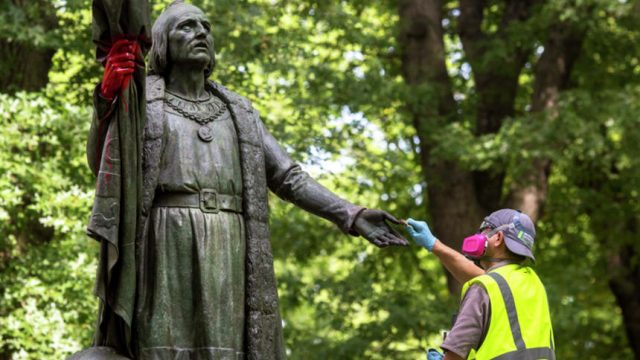The Roots of Anti-Columbus Day Activism May Surprise You

A worker removes red paint from the hand of a Christopher Columbus statue in Central Park in New York, Sept. 12, 2017. The 1892 bronze statue was found covered with graffiti, its hands painted red. Statues of the 15th-century explorer have come under scrutiny amid a larger debate about monuments to controversial historical figures. (Dave Sanders/The New York Times)
I’ll admit that I don’t care much about Columbus Day.
I think the explorer himself is a fascinating historical figure, and his accomplishments (along with their ramifications both good and bad) worthy of study, but a federal holiday? Do you think any of the workers off today are spending their time boning up on Columbian history?
I do find the anti-Columbus activism which has become more heated in recent years to be nauseating, though. If the traditional hagiography on Columbus Day is shallow, so is the anti-Columbus argument that his legacy is entirely negative.
History is complicated stuff. The Columbian expeditions were amazingly successful from the European point of view. The point of view of the indigenous peoples of North and South America is quite different.
Neither of these perspectives is wrong. Why not embrace them both?
Anyway, surprising to me is that anti-Columbus activism actually has a long history. Jennifer Braceras, writing in National Review today, points out that the original Communists hated Columbus:
Friedrich Engels, who with Marx authored the Communist Manifesto, lambasted Columbus as the godfather of modern capitalism. According to Engels, Columbus’s westward journeys unleashed the era of “big commerce,” the world market, and the birth of the bourgeoisie. “The discovery of America was connected with the advent of machinery,” he wrote in 1847, “and with that the struggle became necessary which we are conducting today, the struggle of the propertyless against the property owners.”
Interestingly the socialists back then, unlike the socialists today, opposed Columbus not because they perceived him as racist but because he was motivated by profits.
Oddly enough, white supremacists have historically hated Columbus Day too, though their derision stemmed largely from anti-Catholic bigotry:
In the 1920s, the Ku Klux Klan promoted negative characterizations of Columbus in order to vilify Catholics and immigrants, many of whom celebrated Columbus not only as a source of ethnic and religious pridebut also as a symbol of the free and diverse society that resulted from the European presence here. The Klan tried to prevent the erection of monuments to the Great Navigator, burned crosses in opposition to efforts to honor him, and argued that commemorations of his voyage were part of a papal plot. Rather than honor a Catholic explorer from the Mediterranean, Klansmen proposed honoring the Norseman Leif Eriksson as discoverer of the New World and a symbol of white pride.
Again, I’m not at all convinced that Columbus Day needs to be a federal holiday (Franklin Roosevelt created it after lobbying from Catholic and Italian-American groups), but I do think his historical legacy deserves better than to be bandied about by a bunch of ideologues.
Columbus and his trips to what was, from the European perspective, the “new world” were a major moment in human history. The ramifications, like most major historical events, were both good and bad. But there’s no denying that it happened.
We should embrace reality, and stop trying to shoehorn it into one political narrative or another.




